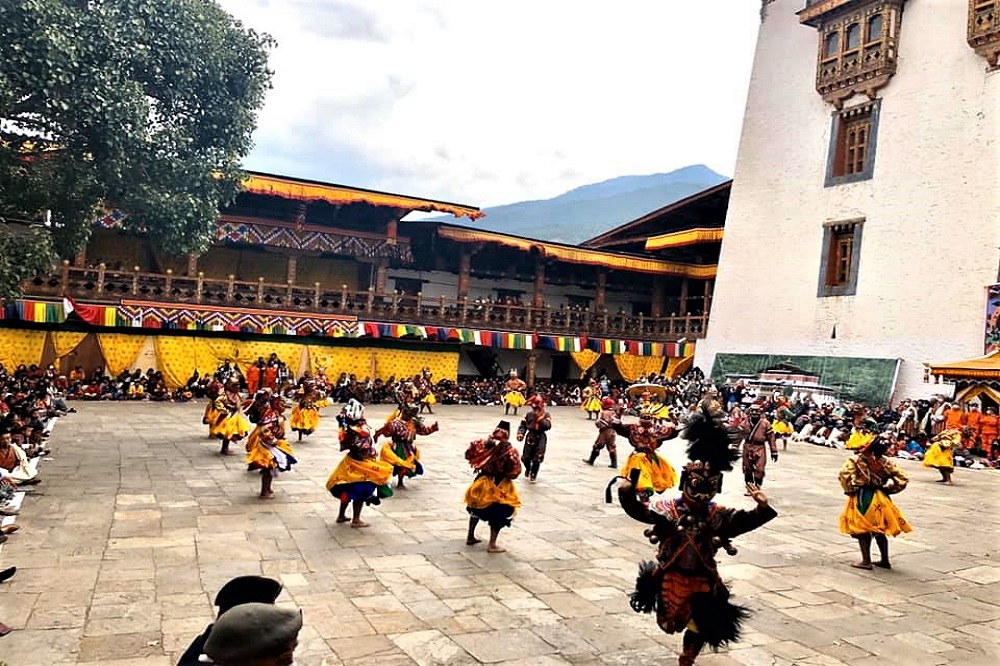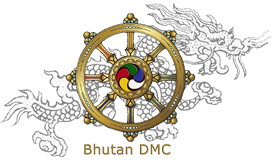Punakha Drubchen & Punakha Tshechu - Popular festivals observed at the famous Punakha Dzong to better preserve Buddhist teachings & to commemorate noble deeds of Zhabdrung Rinpoche

Punakha district is situated in western Bhutan, bordered by Gasa district to the north, Thimphu to the west and district of Wangduephodrang to the east and south. Until 1955, Punakha served as the winter capital of Bhutan. Owing to its favourable temperate climate conditions and fertile land, Punakha is agriculturally rich valley and known for its lush rice fields, vegetable and fruit production.
Both Punakha Drubchen & Punakha Tshechu festivals are celebrated at Punakha Dzong which is also called ‘The Palace of Great Happiness or Bliss’. It is the second largest and the second oldest Dzongs in Bhutan built by Zhabdrung Ngawang Namgyal in 1637-38. Located at the confluence of Pho Chhu (father) and Mo Chhu (mother) rivers in the Punakha – Wangdue valley, this majestic and historically most significant fortress is also the winter seat of Je Khenpo (Chief Abbot).
Punakha has been of extreme importance to Bhutan since the time of the Zhabdrung Ngawang Namgyal in the 17th century. Zhabdrung is known as the unifier of Bhutan and credited to give Bhutan and its people a distinct cultural identity.
During 17th century Bhutan was frequently invaded by Tibetan forces seeking to seize a very precious relic, the Ranjung Kharsapani. Zhabdrung Ngawang Namgyal led the Bhutanese a victory over the Tibetan invaders and to celebrate the triumph, he introduced Punakha Drubchen. Since then, Punakha Drubchen also known as Puna Drubchen has been the annual festival of Punakha district. It is a unique festival recreating the scene from the 17th century battle with Tibetan army. The ‘pazaps’ or local militia men dress in their traditional battle gear re-enact the ancient battle scene. This re-enactment retracts back to time when in absence of standing army, men from eight village blocks of Thimphu came forward and managed to expel the invading Tibetan forces from the soil of Bhutan. Their victory ushered in a period of new-found internal peace and stability in the country.
In 2005, another festival called ‘Punakha Tshechu’ was introduced by the 70th Je Khenpo Trulku Jigme Choedra and the then Home Minister His Excellency Lyonpo Jigme Yoedzer Thinely. The Tshechu was introduced in response to the requests made by Punakha District Administration and local people, to host a religious festival in order to better preserve Buddhist teachings and keep alive noble deeds of Zhabdrung Rinpoche.
Both Punakha Drubhen & Punakha Tshechu festivals play an important role in preserving Bhutan’s rich culture and traditions and provide devout Buddhists an opportunity to celebrate Dharma and follow the righteous path.
(Image credit: Punakha Dzongkhag Administration)
HOTELS IN THIMPHU
HOTELS IN PUNAKHA & WANGDUE
HOTELS IN GANGTEY
HOTELS IN TRONGSA
HOTELS IN BUMTHANG
HOTELS IN MONGAR
HOTELS IN TRASHIGANG
HOTELS IN SAMDRUP JONGKHAR
HOTELS IN PHUENTSHOLING
HOTELS IN HAA
HOTELS IN GELEPHU
HOTELS IN ZHEMGANG
RESTAURANTS IN PARO
RESTAURANTS IN THIMPHU
RESTAURANTS IN PUNAKHA
TOUR ITINERARIES
TREKKING ITINERARIES
SPECIAL INTERESTS TOURS
UNIQUE FESTIVALS & FAIRS
BLOG


